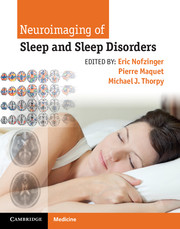Book contents
- Neuroimaging of Sleep and Sleep Disorders
- Neuroimaging of Sleep and Sleep Disorders
- Copyright page
- Contents
- Contributors
- Foreword
- Preface
- Section 1 Introduction
- Section 2 Neuroimaging of wakefulness and sleep
- Section 3 Neuroimaging, sleep loss, and circadian misalignment
- Section 4 Sleep and memory
- Section 5 Neuroimaging of sleep disorders
- Chapter 23 Imaging causes and consequences of insomnia and sleep complaints
- Chapter 24 Functional neuroimaging of primary insomnia
- Chapter 25 Sleep neuroimaging in depression and schizophrenia
- Chapter 26 Structural neuroimaging of narcolepsy
- Chapter 27 Functional neuroimaging of narcolepsy
- Chapter 28 Neuroimaging of treatment response in narcolepsy
- Chapter 29 Modafinil effects in narcolepsy
- Chapter 30 Neuroimaging of Kleine–Levin syndrome
- Chapter 31 Neuroimaging of cataplexy
- Chapter 32 Structural brain neuroimaging changes in obstructive sleep apnea
- Chapter 33 Imaging the airway in obstructive sleep apnea
- Chapter 34 Neuroimaging of cognitive effects in obstructive sleep apnea
- Chapter 35 Neuroimaging of autonomic dysfunction and ventilatory control in obstructive sleep apnea
- Chapter 36 Neuroimaging of treatment effects in obstructive sleep apnea
- Chapter 37 Structural and functional neuroimaging of congenital central hypoventilation syndrome
- Chapter 38 Neuroimaging of disorders of arousal and other parasomnias
- Chapter 39 Neuroimaging of Parkinson’s disease and multiple system atrophy in patients with sleep disturbance
- Chapter 40 Neuroimaging of idiopathic REM sleep behavior disorder
- Chapter 41 Cardiac123I-MIBG scintigraphic findings and REM sleep behavior disorder
- Chapter 42 Neuroimaging and posttraumatic stress disorder
- Chapter 43 Neuroimaging of sleepwalking
- Chapter 44 Neuroimaging of the brainstem in parasomnia overlap disorder
- Chapter 45 Nocturnal wanderings and an arachnoid cyst
- Chapter 46 Structural and functional neuroimaging of restless legs syndrome and periodic limb movements in sleep
- Chapter 47 Functional neuroimaging of dopamine, iron, and opiates in restless legs syndrome
- Chapter 48 Neuroimaging and fatal familial insomnia
- Chapter 49 Neuroimaging of sleep-related epilepsies
- Chapter 50 Sleep, neuroimaging, and polysomnography of Wilson’s disease
- Chapter 51 Functional neuroimaging: sedating medication effects
- Chapter 52 Functional neuroimaging of alerting medication effects
- Chapter 53 Zolpidem-induced parasomnias
- Index
Chapter 27 - Functional neuroimaging of narcolepsy
from Section 5 - Neuroimaging of sleep disorders
Published online by Cambridge University Press: 05 March 2013
- Neuroimaging of Sleep and Sleep Disorders
- Neuroimaging of Sleep and Sleep Disorders
- Copyright page
- Contents
- Contributors
- Foreword
- Preface
- Section 1 Introduction
- Section 2 Neuroimaging of wakefulness and sleep
- Section 3 Neuroimaging, sleep loss, and circadian misalignment
- Section 4 Sleep and memory
- Section 5 Neuroimaging of sleep disorders
- Chapter 23 Imaging causes and consequences of insomnia and sleep complaints
- Chapter 24 Functional neuroimaging of primary insomnia
- Chapter 25 Sleep neuroimaging in depression and schizophrenia
- Chapter 26 Structural neuroimaging of narcolepsy
- Chapter 27 Functional neuroimaging of narcolepsy
- Chapter 28 Neuroimaging of treatment response in narcolepsy
- Chapter 29 Modafinil effects in narcolepsy
- Chapter 30 Neuroimaging of Kleine–Levin syndrome
- Chapter 31 Neuroimaging of cataplexy
- Chapter 32 Structural brain neuroimaging changes in obstructive sleep apnea
- Chapter 33 Imaging the airway in obstructive sleep apnea
- Chapter 34 Neuroimaging of cognitive effects in obstructive sleep apnea
- Chapter 35 Neuroimaging of autonomic dysfunction and ventilatory control in obstructive sleep apnea
- Chapter 36 Neuroimaging of treatment effects in obstructive sleep apnea
- Chapter 37 Structural and functional neuroimaging of congenital central hypoventilation syndrome
- Chapter 38 Neuroimaging of disorders of arousal and other parasomnias
- Chapter 39 Neuroimaging of Parkinson’s disease and multiple system atrophy in patients with sleep disturbance
- Chapter 40 Neuroimaging of idiopathic REM sleep behavior disorder
- Chapter 41 Cardiac123I-MIBG scintigraphic findings and REM sleep behavior disorder
- Chapter 42 Neuroimaging and posttraumatic stress disorder
- Chapter 43 Neuroimaging of sleepwalking
- Chapter 44 Neuroimaging of the brainstem in parasomnia overlap disorder
- Chapter 45 Nocturnal wanderings and an arachnoid cyst
- Chapter 46 Structural and functional neuroimaging of restless legs syndrome and periodic limb movements in sleep
- Chapter 47 Functional neuroimaging of dopamine, iron, and opiates in restless legs syndrome
- Chapter 48 Neuroimaging and fatal familial insomnia
- Chapter 49 Neuroimaging of sleep-related epilepsies
- Chapter 50 Sleep, neuroimaging, and polysomnography of Wilson’s disease
- Chapter 51 Functional neuroimaging: sedating medication effects
- Chapter 52 Functional neuroimaging of alerting medication effects
- Chapter 53 Zolpidem-induced parasomnias
- Index
Summary
Keywords
- Type
- Chapter
- Information
- Neuroimaging of Sleep and Sleep Disorders , pp. 223 - 227Publisher: Cambridge University PressPrint publication year: 2013
- 2
- Cited by

